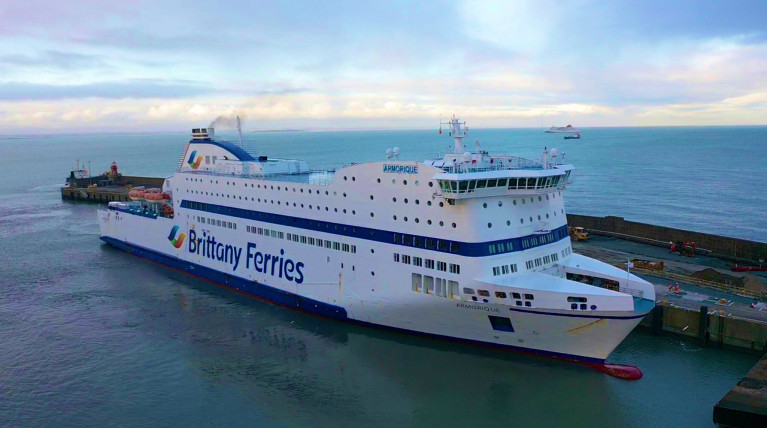Once again another 'Brexit bypass' ferry but by Brittany Ferries begins operating this evening (8pm/2000hrs) on a new 'freight' route of Ireland-France through St. Malo, which is a first to connect Wexford and the French region, writes Jehan Ashmore.
As part of the ongoing developments since the UK left the EU, Irish hauliers have been demanding direct ro-ro routes to marketplaces in mainland Europe. This to avoid Brexit/EU border customs paperwork and potential delays on the UK land-bridge on the Irish Sea and especially through Dover.
According to Brittany Ferries, the first sailing takes place from Rosslare (Europort) Harbour this evening so to transport Irish lorries and their drivers to the Breton town of St Malo. The ferry operator (as of a lunchtime today) had reported that space was available on board.
The new routes form part of an enhanced 'freight' network to be introduced by Brittany Ferries: they are Rosslare-St. Malo, Rosslare-Roscoff in addition Cork-St. Malo and Cork-Roscoff. In addition Brittany already operate a Rosslare-Bilbao route in northern Spain.
Last year a short-lived Rosslare-Roscoff 'seasonal' (then with passengers) route was inaugurated but was abandoned in favour of the Cherbourg at hauliers preferred the transport hub of Cherbourg, so it appears the former route will prove less popular.
The port of Roscoff, was where the humble origins of the company began by exporting Breton based vegetables to Plymouth. This took place on 2 January 1973 using the freight only Kerisnel that entered service only 24 hours after Great Britain's entry into the common market of the European Economic Community (EEC) now the EU.
As for the Armorique, the cruiseferry's career began in 2009 on the Roscoff-Plymouth route and taking the same name of a predecessor that during the 1970's assisted the company in becoming the largest operator on the western English Channel, Ireland and Spain.
The debut of Armorique tonight follows in the wake of that original Armorique that incidentally was chartered to Irish Ferries and out of Rosslare in 1989 (Afloat will have a reflective piece on this).
As for these new developments, the Cork-St. Malo route is another 'freight' first for Brittany though a passenger service existed in 1990's. So the boost out of Cork (to Santander closed last year) is consolidated and as the only operator using the southern port to Brittany. There will be three round trips each week, with departures from Cork on Tuesdays and Saturdays, and from Rosslare on Thursdays.
This is the French operator's second response to a Brexit-Bypass solution as they opened a Rosslare-Cherbourg service last month, initially served Cap Finistère.
A ropax, Connemara of the popular 'Visentini' built series is to takeover later this month as Afloat reported before but in this update the sailing is confirmed to be next Monday, and outward of Rosslare.
As detailed below is Amorique's four route network and sailing schedule
Day Depart Time Arrive Time (next day)
Monday Roscoff 20:00 Cork 14:00
Tuesday Cork 20:00 Roscoff 14:00
Wednesday Roscoff 20:00 Rosslare 14:00
Thursday Rosslare 20:00 St Malo 17:10
Friday St Malo 20:00 Cork 15:00
Saturday Cork 18:00 Roscoff 12:40
NOTE: Timetables are subject to weekly variation and change at short notice
As previously highlighted, Armorique is to operate the new route linking Leinster and Brittany, though in 2019 the ferry had stood in covering the 'seasonal' Cork-Roscoff route taking 'holidaymaker's along with motorist cars and freight vehicles.
Since the custom built cruiseferry Armorique entered service, it had usually taken holidaymakers from UK to France having made a debut on the Breton-Cornwall route as alluded above. In addition to relief duties on the English Channel including Portsmouth-Caen as Afloat reported some years back.
Afloat yesterday tracked Armorique having departed from a period of been laid-up in Le Havre. The cruiseferry from there made the short coastal passage to Caen (Ouistreham) in Normandy, where a terminal was custom built for Brittany Ferries to inaugurate in 1986 a new route to Portsmouth.


























































